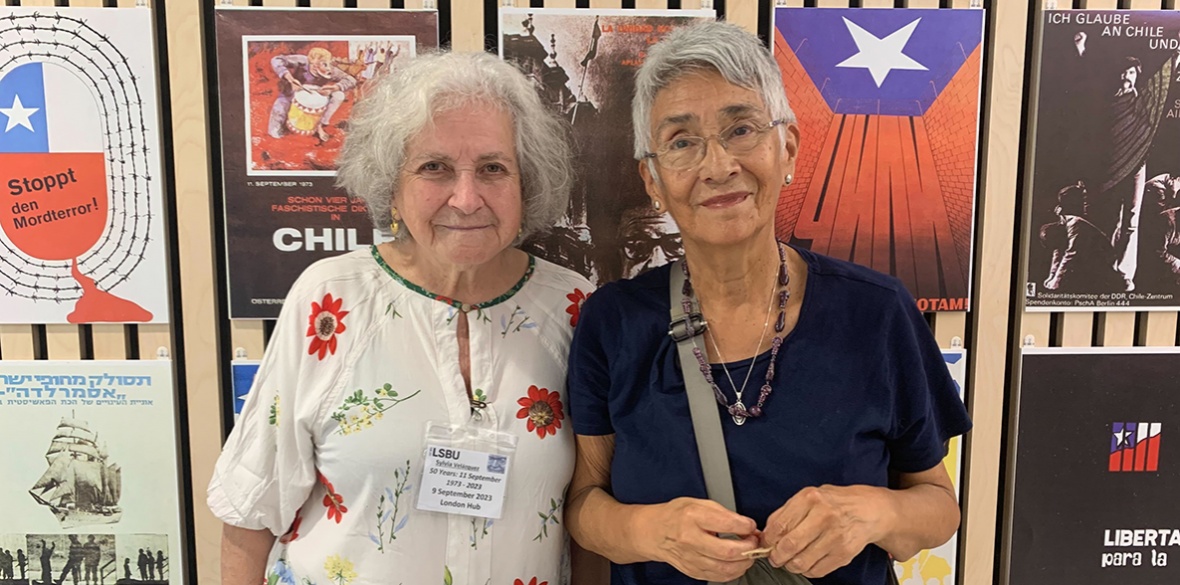This is the last article you can read this month
You can read more article this month
You can read more articles this month
Sorry your limit is up for this month
Reset on:
Please help support the Morning Star by subscribing here
JUANI COLQUE was an activist with the Popular Unitary Action Movement and worked as a chemical analyst in the animal food factory Ralston Purina.
“That fateful morning on September 11, I arrived as best I could to my workplace, Ralston Purina in Limache, the first company to be nationalised, by [Salvador] Allende’s regime.
“Before 7am the marines were already occupying the train station. Fortunately, a relative took us through roads, almost unsuitable for vehicles, to the factory.
“In spite of what we could see happening and that there had been a coup attempt a few months before, there was still an atmosphere of disbelief. How was it possible that this could be happening?
“Suddenly, over the crackling of radio waves, we heard the words of Salvador Allende, our comrade president, thanking the people and saying goodbye — only then we realised that this was serious.
“We had talked about what should be done in this eventuality, how to try to immobilise production, what part of the machinery should be removed, and so on.
“There were no weapons in the factory or anything like that. Each worker in their section concluded what to do at that critical moment — to take out what would be useful for the resistance in which we were already involved.
“The arrival of the marines at the factory was very tense. A couple of members of the accounting section, rumoured to be Christian Democrats, engaged in conversations with their superiors.
“Suddenly, we were forced to lay on the floor with our hands behind our heads in the yard, guarded by armed marines with faces painted black.
“Somehow, I found myself standing up and walking to the nearest guard and while grabbing my pregnant belly with two hands, I told him that I felt unwell and needed my husband.
“I never thought they’d let us out without proof of identity, but they did, and we found ourselves outside the factory gates in a deadly silent street.
“We heard gunshots from the neighbouring CCU factory; the workers at CCU did not hand themselves over to the military without a fight.
“To this day, the factory bears the gunshot marks on its walls, the scars of a battle, a fight to defend the aspirations of the workers, the defence of a socialist dream.
“I later found out that Jaime Aldoney the government representative from CCU was taken from the factory and ‘disappeared,’ and we also heard that the government representative from Parma was lowered into a well in the factory and left for dead.
“Afterwards, we heard our comrades, peasant leaders, trade unionists and priests were being executed.
“My husband who worked at Cora, the agrarian reform corporation set up by Allende’s government, was detained and tortured twice before he could flee to Argentina.
“We were not safe. I sought exile in Britain and arrived in May 1977, with my five-year-old daughter. Her brother was too young to travel but would join us a few years later.
“We arrived in England as political exiles in May 1977. I worked in a flour mill in Northampton for over 40 years, retiring as a senior analyst around eight years ago.”
Sylvia Velasquez arrived in Britain in 1977, a single mother, pregnant with four children.
“In Talca, Chile, I worked in different primary and secondary schools, as well as the University of Chile and the Technical University.
“As a university student, I participated in an independent left-wing group formed by students from different political parties and I was a member of several unions.”
During Allende’s Popular Unity government, the Education Workers Union was made up of teachers, security staff, cleaners, cooks and everyone who worked in schools.
“As a political activist, I lived in a shanty town where I participated in literacy campaigns. I also participated in the distribution of popular food baskets.
“Due to the boycott by the right, supplies never arrived in remote places, supermarkets and small independent shops.
“There was a shortage of milk for babies and children, and despite the government programme distributing free milk and free school meals for primary, secondary and university students, it was not enough for all families.
“In winter, I participated in rescue operations in areas flooded by rain or for people left homeless because their homes were destroyed due to poor materials not resistant to strong winds and rain.
“From the moment Allende was elected, you could see the attacks of the imperialists and the Chilean right. The coup was long foreseen.
“Horrible stories of the dictatorship in Brazil were heard, but I thought we were strong, organised and that the people who for the first time had access to free health, housing and education, owned the land they ploughed, owned the factories they worked, owned its natural resources, would to take to the streets to defend their achievement and the Popular Unity government.
“But the enemy worked from the darkness. Unions, political parties and the army were infiltrated for a long time before the coup and the conscious and committed people were crushed.
“Little did I imagine that today, 50 years after the dictatorship, there would still be no answers for the disappeared or justice for all those executed and missing.”










